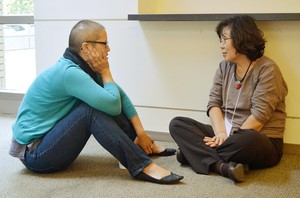“Women in the church, to me, are like flames. They’re strong, life-giving forces in the church that, with the right kindling, will continue to grow and expand their reach,” says Sera Chung, associate for Gender and Racial Justice at the Presbyterian Church (U.S.A.) “As a church, it’s important for us to figure out how we can continue to feed these flames, and not to stifle them to the point of burning out.”
For three days this fall, women from across the Presbyterian Church (U.S.A.) gathered together in Chicago for the Study on the Status of Women Theological Consultation to examine ways that the church can feed the flames of women in leadership in the church, and to explore the intersecting dynamics of gender, race, ethnicity, age, and how these impact the experiences of women in the church.
“Our goal with the consultation was to connect—to bridge the missing stories of women, and claim the voice and agency of current and next generation of women leaders; to equip—identify, create, and make available up-to-date resources; and to inspire—organize to change. Our mission is to be brave, bold, and Biblical,” says Chung. “This is just the beginning. From here, we’ll continue conversations and work together to help address the needs of women across the church.”
Dr. Frank Yamada, president of McCormick Theological Seminary, delivered opening remarks, and the Rev. Dr. Elizabeth Hinson-Hasty, professor and chair of theology at Bellarmine University, set the stage for the weekend by sharing the history of the Study on the Status of Women with attendees.
“We know relatively little about the experience of women who serve the church as ruling elders, deacons, Christian educators, candidates for ministry, those who serve extra-parish ministries or in other roles in congregations,” said Hinson-Hasty. “Conversations like the one you’ll have here, along with the sociological findings from Research Services will help shed light on the true experience of women in the church, and will help outline where we as a denomination need to go from here.”
A panel discussion explored resources that already exist in detail, and discussed gaps that may need to be filled with new or updated resources for the church.
“Many of these women have deep ties to the church and are full of historical knowledge,” says Chung. “Many have seen resources developed or conversations about equity and equality happen, but don’t see much follow through. That’s led to a lot of hurt and frustration for women across the entire denomination. These conversations also shed some light on the lack of awareness of all of the resources that exist. That’s an issue that we need to figure out how to address, and we hope that these conversations can help shape how we do that moving forward.
The Study on the Status of Women Theological Consultation is unique because it requires a commitment for action beyond the gathering. Attendees will continue to hold discussions and gatherings over the coming months, and will work closely with Chung to meet the needs of women in the church to begin to impact change.
“Have we made progress? Absolutely,” says Chung. “Do we have a long way to go? Absolutely.”
-----
To learn more about the Study on the Status of Women, visit www.pcusa.org/genderjustice.

